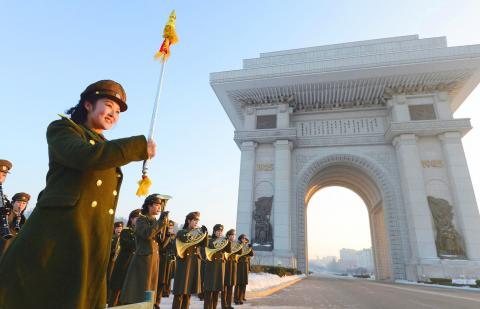North Korea successfully launched a rocket yesterday, boosting the credentials of its new leader and stepping up the threat the isolated state poses to opponents.
The rocket, which North Korea says put a weather satellite into orbit, has been labeled by the US, South Korea and Japan as a test of technology that could one day deliver a nuclear warhead capable of hitting targets as far as the US.
The rocket was launched just before 10am, defense officials in South Korea and Japan said, and was more successful than a rocket launched in April that flew for less than two minutes.

Photo: Reuters
The North American Aerospace Defense Command (NORAD) said that it “deployed an object that appeared to achieve orbit,” the first time an independent body has verified North Korean claims.
North Korea is banned from developing nuclear and missile-related technology under UN resolutions, although North Korean leader Kim Jong-un is believed to have continued the state’s “military first” program put in place by his late father and former North Korean leader Kim Jong-il.
The US condemned the launch as “provocative” and a breach of UN rules, while Japan’s UN envoy called for a UN Security Council meeting. However, diplomats say further tough sanctions are unlikely as China will oppose them.
Former Japanese prime minister Shinzo Abe urged a UN resolution “strongly criticizing” Pyongyang.
A North Korean Ministry of Foreign Affairs spokesman said that the rocket was a “peaceful project.”
“The attempt to see our satellite launch as a long-range missile launch for military purposes comes from hostile perception that tries to designate us a cause for security tension,” KCNA cited him as saying.
China had expressed “deep concern” prior to the launch, which was announced a day after a top Chinese Communist Party Politburo member met Kim Jong-un in Pyongyang.
“China believes the Security Council’s response should be cautious and moderate, protect the overall peaceful and stable situation on the Korean Peninsula, and avoid an escalation,” Chinese Ministry of Foreign Affairs spokesman Hong Lei (洪磊) said.

The US government has signed defense cooperation agreements with Japan and the Philippines to boost the deterrence capabilities of countries in the first island chain, a report by the National Security Bureau (NSB) showed. The main countries on the first island chain include the two nations and Taiwan. The bureau is to present the report at a meeting of the legislature’s Foreign Affairs and National Defense Committee tomorrow. The US military has deployed Typhon missile systems to Japan’s Yamaguchi Prefecture and Zambales province in the Philippines during their joint military exercises. It has also installed NMESIS anti-ship systems in Japan’s Okinawa

‘WIN-WIN’: The Philippines, and central and eastern European countries are important potential drone cooperation partners, Minister of Foreign Affairs Lin Chia-lung said Minister of Foreign Affairs Lin Chia-lung (林佳龍) in an interview published yesterday confirmed that there are joint ventures between Taiwan and Poland in the drone industry. Lin made the remark in an exclusive interview with the Chinese-language Liberty Times (the Taipei Times’ sister paper). The government-backed Taiwan Excellence Drone International Business Opportunities Alliance and the Polish Chamber of Unmanned Systems on Wednesday last week signed a memorandum of understanding in Poland to develop a “non-China” supply chain for drones and work together on key technologies. Asked if Taiwan prioritized Poland among central and eastern European countries in drone collaboration, Lin

BACK TO WORK? Prosecutors said they are considering filing an appeal, while the Hsinchu City Government said it has applied for Ann Kao’s reinstatement as mayor The High Court yesterday found suspended Hsinchu mayor Ann Kao (高虹安) not guilty of embezzling assistant fees, reducing her sentence to six months in prison commutable to a fine from seven years and four months. The verdict acquitted Kao of the corruption charge, but found her guilty of causing a public official to commit document forgery. The High Prosecutors’ Office said it is reviewing the ruling and considering whether to file an appeal. The Taipei District Court in July last year sentenced Kao to seven years and four months in prison, along with a four-year deprivation of civil rights, for contravening the Anti-Corruption

NO CONFIDENCE MOTION? The premier said that being toppled by the legislature for defending the Constitution would be a democratic badge of honor for him Premier Cho Jung-tai (卓榮泰) yesterday announced that the Cabinet would not countersign the amendments to the local revenue-sharing law passed by the Legislative Yuan last month. Cho said the decision not to countersign the amendments to the Act Governing the Allocation of Government Revenues and Expenditures (財政收支劃分法) was made in accordance with the Constitution. “The decision aims to safeguard our Constitution,” he said. The Constitution stipulates the president shall, in accordance with law, promulgate laws and issue mandates with the countersignature of the head of the Executive Yuan, or with the countersignatures of both the head of the Executive Yuan and ministers or